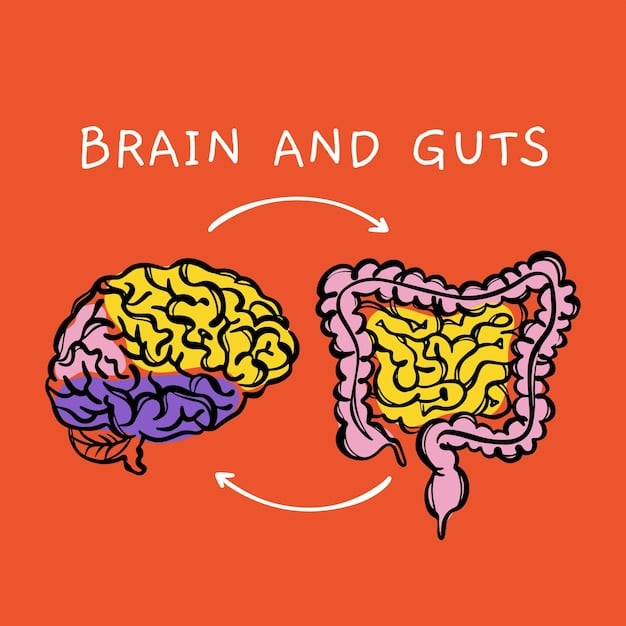Boost Your Mood: The Role of Nutrition in Mental Health

The role of nutrition in mental health is significant, with specific foods capable of influencing neurotransmitter production, reducing inflammation, and ultimately boosting mood and overall psychological well-being.
Did you know that what you eat can significantly impact your mental wellbeing? Exploring the role of nutrition in mental health: foods that boost your mood opens up a world of possibilities for enhancing your overall psychological state through diet.
Understanding the Gut-Brain Connection
The relationship between the gut and the brain is more profound than many realize. This intricate communication system significantly impacts our mental health. The gut-brain axis involves biochemical signaling that occurs between the gastrointestinal tract and the central nervous system.
The Microbiome’s Influence
The gut microbiome, consisting of trillions of bacteria, fungi, and other microorganisms, plays a crucial role in this connection. These microbes produce neurotransmitters, such as serotonin and dopamine, which are vital for mood regulation.
An imbalance in the gut microbiome, often referred to as dysbiosis, can negatively affect mental health. Factors like poor diet, stress, and antibiotic use can disrupt the delicate balance of gut flora.

How Gut Health Affects Mental Health
The gut influences mental health in several ways. Firstly, the gut produces a significant portion of the body’s serotonin, a neurotransmitter that stabilizes mood, feelings of well-being, and happiness. Secondly, the gut impacts inflammation levels in the body, which are linked to mental disorders like depression and anxiety.
- Neurotransmitter Production: The gut produces key neurotransmitters that affect mood.
- Inflammation: Gut health influences systemic inflammation, impacting mental state.
- Vagus Nerve: The vagus nerve facilitates direct communication between the gut and brain.
Supporting a healthy gut microbiome through diet and lifestyle choices can have a positive impact on mental wellbeing. Consuming probiotics, prebiotics, and a diverse range of plant-based foods can promote a balanced and thriving gut.
The Impact of Diet on Neurotransmitters
What we eat directly affects the production and regulation of neurotransmitters in the brain. These chemical messengers play vital roles in mood, sleep, and cognitive function. Key nutrients are essential for synthesizing these neurotransmitters, making dietary choices critical for mental health.
Key Nutrients and Their Roles
Several nutrients are essential for neurotransmitter synthesis. Amino acids, vitamins, and minerals are building blocks and cofactors in the production of these crucial chemical messengers.
For example, tryptophan is an amino acid necessary for serotonin production. Similarly, tyrosine is a precursor to dopamine and norepinephrine, which affect motivation and alertness. Deficiencies in these nutrients can lead to imbalances in neurotransmitter levels.
Foods That Boost Neurotransmitters
Incorporating specific foods into your diet can help support neurotransmitter production. Foods rich in tryptophan, tyrosine, and other essential nutrients can positively influence mood and cognitive function.
- Turkey and Chicken: High in tryptophan, promoting serotonin production.
- Almonds and Seeds: Provide tyrosine and magnesium for dopamine and norepinephrine synthesis.
- Eggs: Contain choline, essential for acetylcholine production, supporting cognitive function.

Consuming a balanced diet rich in these essential nutrients can help ensure optimal neurotransmitter production, leading to improved mood and cognitive performance. Consider adding these foods to your daily meals for enhanced mental wellbeing.
Essential Vitamins and Minerals for Mood Regulation
Vitamins and minerals play critical roles in regulating mood and supporting overall mental health. Deficiencies in certain vitamins and minerals have been linked to increased risks of mood disorders. Ensuring adequate intake of these nutrients is crucial for maintaining psychological wellbeing.
Vitamin D and Its Significance
Vitamin D is essential for brain function and mood regulation. It influences the production and release of neurotransmitters like serotonin. Lack of sunlight exposure and inadequate dietary intake can lead to vitamin D deficiency.
Studies have shown that low levels of vitamin D are associated with an increased risk of depression and seasonal affective disorder (SAD). Supplementation with vitamin D can improve mood in deficient individuals.
B Vitamins for Mental Health
B vitamins, including B12, B6, and folate, are vital for nerve function and neurotransmitter synthesis. They play a role in converting nutrients into energy and supporting brain health.
- Vitamin B12: Essential for nerve function and can improve mood in deficient individuals.
- Vitamin B6: Involved in the synthesis of serotonin and dopamine.
- Folate: Important for brain development and can help reduce symptoms of depression.
Adequate intake of B vitamins through diet or supplementation can support optimal brain function and mood regulation. Foods rich in B vitamins include leafy greens, eggs, and lean meats.
Consuming a balanced diet rich in these essential vitamins and minerals can significantly impact mood and overall mental health. Regular blood tests can help identify any deficiencies and guide appropriate supplementation strategies.
The Role of Omega-3 Fatty Acids
Omega-3 fatty acids, particularly EPA and DHA, are essential for brain health and play a crucial role in mood regulation. These fats are integral components of cell membranes and influence neurotransmitter function.
Benefits of EPA and DHA
EPA (eicosapentaenoic acid) and DHA (docosahexaenoic acid) have been shown to have mood-boosting effects. They can reduce inflammation in the brain and improve neurotransmitter signaling.
Studies suggest that omega-3 supplementation can help reduce symptoms of depression and anxiety. These fats are particularly beneficial for individuals with mood disorders and can enhance the effectiveness of traditional treatments.
Best Food Sources of Omega-3s
Incorporating foods rich in omega-3 fatty acids into your diet can support brain health and improve mood. Fatty fish, flaxseeds, and walnuts are excellent sources of these essential fats.
Consider adding these foods to your weekly meals to enhance your mental wellbeing. Supplements are also an option for individuals who struggle to obtain enough omega-3s through diet alone.
Ensuring adequate intake of omega-3 fatty acids through diet or supplementation can have a positive impact on mood and overall mental health. These fats are cornerstones of brain health and essential for maintaining psychological wellbeing.
Foods to Avoid for Better Mental Health
Certain foods can negatively impact mental health by disrupting neurotransmitter balance and promoting inflammation. Limiting or avoiding these foods can contribute to improved mood and overall psychological wellbeing. Processed foods, sugary drinks, and excessive caffeine intake can have detrimental effects.
The Impact of Processed Foods
Processed foods are often high in refined sugars, unhealthy fats, and artificial additives. These ingredients can disrupt gut health and increase inflammation in the brain.
Regular consumption of processed foods has been linked to increased risks of depression and anxiety. These foods lack essential nutrients and can interfere with neurotransmitter production.
The Downside of Sugary Drinks
Sugary drinks, such as soda and sweetened beverages, can cause rapid spikes in blood sugar levels, leading to mood swings and energy crashes. High sugar intake is associated with inflammation and can disrupt brain function.
- Blood Sugar Spikes: Leading to mood swings and energy crashes.
- Inflammation: Contributing to mental health issues.
- Nutrient Depletion: Lacking essential nutrients for brain health.
Limiting or eliminating sugary drinks from your diet can stabilize mood and improve overall mental wellbeing.
By avoiding these detrimental foods and focusing on nutritious alternatives, you can support improved mood and psychological wellbeing. Making conscious dietary choices is an essential step for maintaining mental health.
Creating a Mood-Boosting Meal Plan
Designing a meal plan that prioritizes mental health involves incorporating foods rich in essential nutrients and avoiding those that can negatively impact mood. A well-balanced and diverse diet can provide the building blocks for neurotransmitter synthesis and support overall brain health.
Sample Breakfast Ideas
Start your day with a mood-boosting breakfast by including ingredients like oats, berries, and nuts. These foods provide sustained energy and support neurotransmitter production.
Consider options like oatmeal with berries and walnuts, or a smoothie with spinach, banana, and almond milk. These choices are rich in vitamins, minerals, and antioxidants.
Lunch and Dinner Suggestions
For lunch and dinner, focus on lean proteins, colorful vegetables, and whole grains. These foods provide essential nutrients and support a healthy gut microbiome.
Examples include grilled chicken salad with mixed greens and avocado, or baked salmon with quinoa and steamed broccoli. These meals are rich in omega-3 fatty acids, vitamins, and minerals.
Adopting a sustainable and enjoyable meal plan can significantly contribute to improved mood and overall mental wellbeing. Making conscious dietary choices is an investment in your psychological health.
| Key Point | Brief Description |
|---|---|
| 🧠 Gut-Brain Connection | The gut microbiome influences neurotransmitter production and mental health. |
| ✅ Essential Nutrients | Vitamins, minerals, and omega-3s are crucial for mood regulation. |
| 🚫 Foods to Avoid | Processed foods and sugary drinks can negatively impact mental health. |
| 🌱 Mood-Boosting Meal Plan | Focus on balanced meals with lean proteins, vegetables, and whole grains. |
Frequently Asked Questions
▼
The gut microbiome produces neurotransmitters and influences inflammation, both of which can significantly impact mood and cognitive function. A healthy gut is vital for mental wellbeing.
▼
Vitamin D and B vitamins, especially B12, B6, and folate, are crucial. They support nerve function and neurotransmitter synthesis, contributing to a balanced and stable mood.
▼
Processed foods, sugary drinks, and excessive caffeine intake should be limited. These can disrupt gut health, cause blood sugar spikes, and increase inflammation, negatively affecting mood.
▼
Omega-3 fatty acids, particularly EPA and DHA, reduce inflammation in the brain and improve neurotransmitter signaling. They can help reduce symptoms of depression and anxiety.
▼
Yes, a balanced diet rich in essential nutrients can significantly boost your mood. Incorporating mood-boosting foods and avoiding detrimental ones can positively impact your mental wellbeing and overall psychological health.
Conclusion
Understanding the role of nutrition in mental health: foods that boost your mood empowers you to take proactive steps towards enhancing your psychological wellbeing. By incorporating nutrient-rich foods and avoiding detrimental ones, you can significantly impact your mood and overall mental health. Prioritizing a balanced and diverse diet is an investment in your long-term psychological wellbeing.





